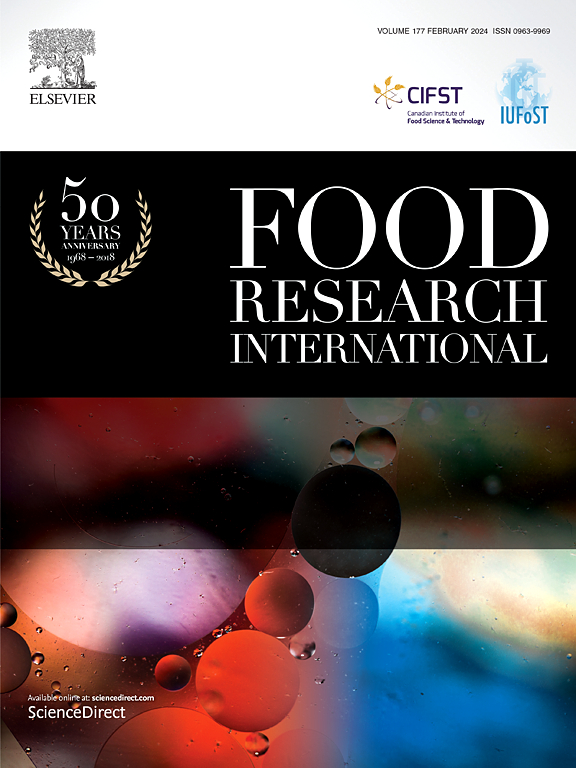Eco-friendly extraction of polysaccharides from Moringa oleifera Lam. leaves using COSMO-RS screened natural deep eutectic solvents
IF 7
1区 农林科学
Q1 FOOD SCIENCE & TECHNOLOGY
引用次数: 0
Abstract
This study aimed to develop a straightforward and efficient method for screening natural deep eutectic solvent (NADES) with high extraction yield of polysaccharides from Moringa oleifera Lam. (M. oleifera) leaves and to elucidate the solubilization mechanism of this eco-friendly extraction solvent. Traditional extraction methods are often limited by low efficiency, long processing times, and environmental hazards, which hinder the advancement of polysaccharide applications. In this study, the conductor-like screening model for realistic solvents (COSMO-RS) was adopted to prognosticate the solubility of biomolecules, and the M. oleifera polysaccharide (MOLP) solubility of 32 NADESs was appraised. Based on the solubility and activity coefficient results, we meticulously selected eight highly efficient NADESs combinations and conducted practical verification. The Bet-LA (Betaine- Lactic acid) combination demonstrated the highest extraction efficiency for MOLP, achieving an ultrasonic-assisted extraction rate 2.67-fold higher than that of the conventional ethanol solvent. The dissolution mechanism was further elucidated using frontier molecular orbital (FMO) and reduced density gradient (RDG) analyses. Antioxidant assays demonstrated that polysaccharides extracted by Bet-LA exhibited superior biological activity. These findings establish an efficient NADES screening protocol and provide mechanistic insights for optimizing M. oleifera leaves polysaccharide extraction.
辣木多糖的环保提取方法。叶片采用cosmos - rs筛选的天然深共晶溶剂
本研究旨在建立一种简单、高效的提取辣木多糖的天然深度共熔溶剂(NADES)筛选方法。并阐明该环保萃取溶剂的增溶机理。传统的提取方法效率低、加工时间长、环境危害大,阻碍了多糖应用的发展。本研究采用现实溶剂类导体筛选模型(cosmos - rs)对生物分子的溶解度进行预测,并对32种NADESs的油松多糖(MOLP)的溶解度进行评价。根据溶解度和活度系数的结果,我们精心选择了8种高效的NADESs组合,并进行了实际验证。甜菜碱-乳酸(Betaine-乳酸)组合对MOLP的提取率最高,超声辅助提取率是常规乙醇溶剂的2.67倍。利用前沿分子轨道(FMO)和还原密度梯度(RDG)分析进一步阐明了其溶解机理。抗氧化实验表明,β - la提取的多糖具有较好的生物活性。这些研究结果建立了有效的NADES筛选方案,并为优化油松叶多糖提取提供了机理见解。
本文章由计算机程序翻译,如有差异,请以英文原文为准。
求助全文
约1分钟内获得全文
求助全文
来源期刊

Food Research International
工程技术-食品科技
CiteScore
12.50
自引率
7.40%
发文量
1183
审稿时长
79 days
期刊介绍:
Food Research International serves as a rapid dissemination platform for significant and impactful research in food science, technology, engineering, and nutrition. The journal focuses on publishing novel, high-quality, and high-impact review papers, original research papers, and letters to the editors across various disciplines in the science and technology of food. Additionally, it follows a policy of publishing special issues on topical and emergent subjects in food research or related areas. Selected, peer-reviewed papers from scientific meetings, workshops, and conferences on the science, technology, and engineering of foods are also featured in special issues.
 求助内容:
求助内容: 应助结果提醒方式:
应助结果提醒方式:


